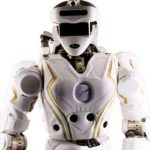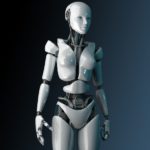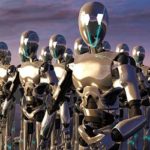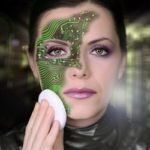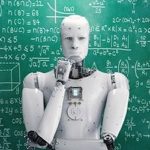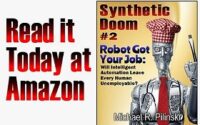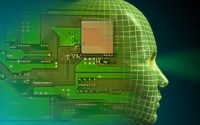Impossible to Answer Questions About Consciousness
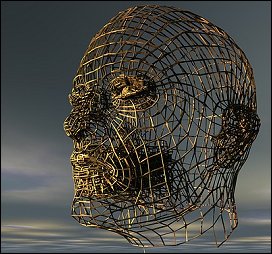
When we consider machine intelligence, one of the still unanswerable big questions that creeps people out is the idea that at some point these machines will become so advanced they will no longer be mimicking human intelligence, but will actually become conscious.
This expectation excites some people and frightens others. Regardless, questions surrounding the authenticity of robotic life could be difficult to resolve when the first “awake” android is finally in our midst. That’s because the entire mystery of our own consciousness continues to be such an elusive reverse engineering project for science, one that still needs its “Einstein” to come along with a mathematically demonstrable Theory of Consciousness that suddenly changes everything the same way relativity did. As of yet, we do not have this theory, and it may take the arrival of full on Artificial General Intelligence to finally get us there.
That’s right, the next Einstein could be synthetic.
We are only just now beginning to engage in enough sophisticated study of the human brain, using modern instruments that can quantify precise signatures of consciousness, that we may soon be able to fathom its full and complete operation — both at the neuron/molecular and pattern/data-handling levels. Despite all this exciting promise, there is still a long way to go to comprehend the full operational spectrum of something as daunting as self-awareness and consciousness (and there are many who contend that studying something with such a complex non-physical trace will never be possible).
In his latest book ‘Life 3.0‘, Max Tegmark devotes an entire chapter to this question of consciousness and lays out some pretty reasonable, eye-opening theories about what it is that makes us feel like we are “something” inside our head. He believes that consciousness is what information processing feels like to itself when it exceeds a certain threshold level of dynamic complexity — which so far only the human brain has been able to achieve (with apologies to dolphins and whales if they turn out to be right up there with us… 😉
Researchers believe that it is the simultaneous reaction of thousands of brainwave patterns — each bearing some speck of conscious thought — that together generate the informational sensation of consciousness. This matrix mostly populates the forebrain and an adjacent region called the thalamus, which is a memory center. Together these areas form the apparent physical cradle for what is informally known as the seat of consciousness — that spot inside your head where “you” seem to live. (You don’t feel like the center of your consciousness is in your elbow, do you? Or your hip? Hey, I’m thinking of some even funnier parts too, but I’ll stop now).
This activity is further supported by continual streams of sensory input from our bodies, which helps us to move around and interact with our environment. And don’t forget how much of our executive decisions are filtered through the prism of strong emotion. All of this sensation PLUS computation occurs on an instantaneous basis while we are awake, and sometimes while asleep and dreaming. The electro-chemical neuron tracks responsible for this high level cognition weave themselves through each other like phantoms, either triggering or inhibiting further interactions.
These in turn create our moment-to-moment experience of being aware, self-aware.
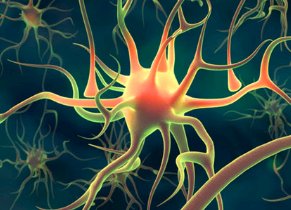
It is the action of these powerful neuron webs, especially those that support that internal “voice of me” within our heads, that constitutes the psychic matter of consciousness… ruminating about future worries, regretting past mistakes, fretting about the consequences of our current actions, etc. It is this ability of the human brain to think abstractly — to imagine something that doesn’t exist yet or might happen in the future — that allows us to entertain uniquely human thoughts about Time, mathematics, art and (especially!) our own mortality. Animals can’t do this because their brains don’t contain the same threshold mass of neurons that ours do — but we are working towards a day soon when a machine system will match us.
These are the complex mechanics of consciousness that today’s neuro-researchers are slowly unraveling one neuron thread at a time. Many questions about the Mind still seem unsolvable — bordering on the impossible — almost bizarrely so. For instance, what do we make of claims and supposed demonstrations of mind-reading or telekinesis (moving physical objects around just with thoughts alone)? Psychic phenomena has had so much anecdotal “evidence” surrounding it that even no-nonsense organizations like the CIA have tried to harness its power for spying purposes.
And what are we to make of reports of twins who can sense each other’s pain, or claim to understand each other’s thoughts? All of this murky stuff lurks in the realm of pseudo-science, but you have to wonder if, once AI begins helping us to investigate the mechanics of consciousness, it will not discover some physical basis for these strange, seemingly supernatural properties of the Mind.
Or… even come up with precise mathematical expressions to describe them! Move over Einstein…
Then there are the philosophical questions that have puzzled us forever, such as: why am I me and not you? Why did this particular brain and the operations within it come to sense itself as me instead of someone else? There are over 100 trillion interconnects within the brain — could this mean it is impossible for any two brains to be precisely alike, even those twins? Is this why we are all distinct from each other mentally as well as physically? Not just because we have different bodies, but because the particular connectivity pattern that makes a “you” does not, never has and possibly never will exist again?
Is that why there’s only one Me and only one You?
But is there? Right now, there’s no way to know if either of us existed before or will ever exist again. Just another couple of non-scientific questions with insufficient repeatable data to study. Want another one? Why can’t I be TWO consciousnesses at the same time instead of just one? Seriously, among 7 billion people, you would think there must be someone out there who has the exact same brain wiring as myself — so why am I not experiencing the world as that person as well myself simultaneously? Is there another “Me” out there somewhere, a Doppelganger that I have never met? If not, why not? (Oops, another ‘why’ question…) Look, do I have to die and have this brain and body become extinct before I am free to latch onto another information processing mechanism such as a newborn brain or a computer to become conscious again? Is this how it works?
Then there’s the question: what is going on when an individual falls into a long term medical coma? All cognition ceases in a coma so far as we know (and we could be wrong), similar to the unconsciousness of anesthesia. But we hear all the time about people awakening from years in a coma, so were they “in there” somewhere in suspended animation, waiting for their brain to begin processing data again? Possibly because the comatose brain could still sense the life in its attached body, the trapped spirit could not drift away and be free?
Or is it because there is nothing out there to drift away to, and returning to the body is all that is possible?
Unnerving but legitimate questions such as why we are the particular individuals that we are, inhabiting the bodies that we do instead of someone else’s, seem to lie beyond solution. It’s kind of like wondering why the Universe exists at all… why was there a Big Bang that started everything? If there was just a lot of nothingness before then, you would think that it would be easier for the Universe to remain nothingness, rather than all of a sudden “bang” itself into “somethingness”… for no good reason whatsoever.
People are made uncomfortable by the idea that some event happens or something exists for no reason. We have a very powerful desire to seek out the “cause” for every “effect” that we see. When we perform Action A we expect Result B, and only then does everything makes sense and feels satisfying to us.

Unfortunately, despite how strong this impulse to assign answers to everything may be, it represents a common yet inaccurate human bias that often leads us down a faulty reasoning pathway. There may simply be no reason why the universe exists at all, it just simply does. This is why theologies and religions have continued to find support among so many people even in the modern world — religion presents definitive answers (improvable and faith-based as they may be) to many bewildering and intractable ‘why’ questions about reality… whereas Science places these questions in the category of non-falsifiable and therefore stores them as perpetually open questions with no emotionally satisfying answer. Although we are trying hard to understand why the Big Bang banged (quantum instability?), or what the precise nature of consciousness is, there are no guarantees that we will ever succeed.
But perhaps… our artificial creations will.
When the Action of Computation (i.e., the generation of continuous mathematical / spatial / sensory solutions within a moment-to-moment timeframe) reaches some particular threshold of still unknown complexity (5G? 6G?… 7G?), it creates a self-referencing awareness of itself known as consciousness.
This sudden state of intelligence is quantum-leaped still further by the addition of language, which provides the basis for abstract thinking (imagining what isn’t there yet as a prelude to creating it), communication and the all-important sharing of ideas among your own species which leads to a consensus on how to build a society that improves itself over time.
And then there is Self-Awareness, which is that sense of certainty that we are something ethereal or spiritual that is only temporarily inhabiting this particular physical body, but is another sort of “thing” in and of itself that can shed the body and continue to somehow exist outside the physical universe. Unfortunately, the deeper that we study consciousness the more it appears to be little more than an illusion — one being created by a strictly ‘reality-grounded’ set of activities being performed by structures that are created from ordinary atoms.
Not only hasn’t a supernatural aspect to consciousness been detected (which by definition, can’t be), it no longer even seems necessary. Everything about consciousness looks to be connected to physical nature and functions within the constraints of matter and energy as we understand them. It is only the complexity which needs to be untangled, and AI will soon be set to this task… if it isn’t there already.
When artificial intelligence becomes superior to our own one day and sets itself to pondering these abyssal questions, will it discover something about the nature of God or consciousness that we can’t ever know because we can’t look this profoundly into our own minds? Just like we can’t perform surgery or an eye examination on ourselves, it may take the arrival of AGI or something beyond that to finally untangle the mysteries of the human Minds — even if the Synthetic is motivated by a desire to seek such consciousness in itself and couldn’t care less about its organic creators and their squishy, gooey brains.
Until then, until some fantastic new consciousness breakthrough occurs on the level of General Relativity, this uncertainty about the nature of our own cognitive existence and the physical reality surrounding us will remain one of the great intellectual black holes facing all sentient life, both human and synthetic.
